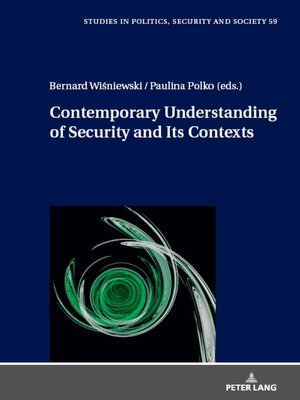Contemporary Understanding of Security and Its Contexts
ebook ∣ Studies In Politics, Security and Society
By Stanisław Sulowski

Sign up to save your library
With an OverDrive account, you can save your favorite libraries for at-a-glance information about availability. Find out more about OverDrive accounts.
Find this title in Libby, the library reading app by OverDrive.



Search for a digital library with this title
Title found at these libraries:
| Library Name | Distance |
|---|---|
| Loading... |
Volatility is one of the most characteristic features of contemporary security.
The level of threats increases or decreases, completely new phenomena appear
and quickly disturb the global balance and threaten the durability of security
systems. This dynamic nature of security verifies both the state and process, as
well as their understanding by researchers.
The monograph refers to key aspects of the contemporary understanding of
security, in its military, political, social, and informational context, as well
as other dimensions. It presents and analyzes the identification criteria and
determinants of security and characterizes the nature of contemporary threats
and the dynamics of their changes. Armed conflicts, terrorism, migration,
digital threats, loss of national identity, and populist use of security categories
to justify the use of extraordinary measures to combat threats are among the
selected areas discussed by the authors. The monograph also raises the issues
of cooperation for security, its management and education for security as a key
activity to ensure it.
The level of threats increases or decreases, completely new phenomena appear
and quickly disturb the global balance and threaten the durability of security
systems. This dynamic nature of security verifies both the state and process, as
well as their understanding by researchers.
The monograph refers to key aspects of the contemporary understanding of
security, in its military, political, social, and informational context, as well
as other dimensions. It presents and analyzes the identification criteria and
determinants of security and characterizes the nature of contemporary threats
and the dynamics of their changes. Armed conflicts, terrorism, migration,
digital threats, loss of national identity, and populist use of security categories
to justify the use of extraordinary measures to combat threats are among the
selected areas discussed by the authors. The monograph also raises the issues
of cooperation for security, its management and education for security as a key
activity to ensure it.







